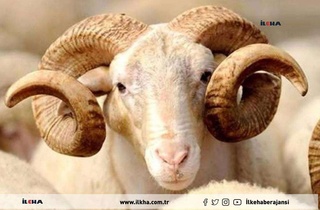At least one third of the meat from the animal must go to poor or vulnerable people. Traditionally, a Muslim would keep one third of the meat for their family and give the final third to their neighbors.
The word is a cognate in several Semitic languages, being composed of the triconsonantal Semitic root q-r-b (ق ر ب); meaning closeness, with the oldest attestation being the Akkadian aqriba.
The word qurban appears thrice in the Qur'an: once in reference to animal sacrifice and twice referring to sacrifice in the general sense of any act which may bring one closer to Allah. In contrast, dhabīḥah refers to normal Islamic slaughter outside the day of udhiyyah. In hadiths regarding the qurban offered during Eid al-Adha, forms of the word udhiyah are often used interchangeably with qurban.
The word's first use in the Qur'anic story of creation pertains to the history of the offerings of Abel and Cain (Habil and Qabil).
“And recite to them the story of the two sons of Adam [Habil (Abel) and Qabil (Cain)] in truth; when each offered a sacrifice (Qurban), it was accepted from the one but not from the other. The latter said to the former: "I will surely kill you." The former said: ‘Verily, Allah accepts only from those who are Al-Muttaqun (the pious).’ (Surah Al-Ma'idah, 27)
In the Qur'anic narrative, it is highlighted that the act of sacrifice itself with impure or impious intentions will not be accepted. Taqwa (God consciousness) is stressed as a criterion for the sacrifice bringing blessings from Allah, underscoring that the ritual itself may be performed in empty and hollow fashion. Abel reasons with his brother, and demonstrates resolve in his own death, vowing to not raise his hand against his own brother in defense or retaliation.
Outside of the Qur'an, the offering is decreased to varying degrees. The 14th century religious scholar Ibn Kathir narrates, taking account from Isra'iliyyat, that Abel had offered a sheep whilst his brother Cain offered part of the crops of his land. The ordained procedure of Allah was that a fire would descend from the heavens and consume the accepted sacrifice. Accordingly, fire came down and enveloped the animal slaughtered by Abel thus accepting the sacrifice of Abel while Cain's sacrifice was rejected. This led to jealousy on the part of Cain resulting in the first human death when he murdered his brother Abel. Refusing to seek repentance for his actions, Cain was not forgiven by Allah and cursed.
For the majority of Muslims, the qurban sacrifice during Eid al-Adha is highly stressed for its religious significance, but not farīḍah (فريضة) or compulsory by law save for in the Hanafi school of law.
The sacrifice of an animal is legal from the morning of the 10th to the sunset of the 13th Dhu l-Hijjah, the 12th lunar month of the Islamic calendar. On these days Muslims all over the world offer qurban which means a sacrifice or slaughter of an animal on specific days.
There are stipulations for the animals offered; they can be sheep, goats, lambs, cows (buffalos, bulls) or camels (in strong contrast to Judaism). The animals must also be healthy, free from disease, and cannot be blind or one-eyed, missing parts of their tails or ears (docking or cropping animals’ ears or tails are forbidden act), and must be sacrificed in accordance with dhabihah standards. Most schools of fiqh accept that the animal must be domesticated.
Moreover, Islamic law forbids stunning of animals prior to the sacrifice so animals typically have their common carotid artery severed without any form of anesthesia.
It is noteworthy that the blood of the sacrificed is discarded, and that no burnt offering analog exists in Islam. The portions of meat are divided in three; one portion goes to the needy and poor, one portion goes to the one performing the sacrifice, and another to their family. One may donate their third to whomever they choose. (ILKHA)



 Dünya
Dünya
 Dünya
Dünya
 Güncel
Güncel
 Dünya
Dünya
 Dünya
Dünya
 Dünya
Dünya
 Dünya
Dünya
 Dünya
Dünya
 Güncel
Güncel
 Güncel
Güncel





